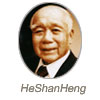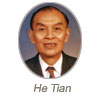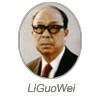AWARDEE OF MEDICAL SCIENCES PRIZE
WANG YONGYAN
Abstract
Wang Yongyan, an expert of Chinese medicine, born in 1938 in Tianjin, China. Completed his study of Chinese medicine from 1956-1962 at the Beijing College of Traditional Chinese Medicine. Now he is the director of the Research Section for Brain Diseases (BUCM), president (Rector) of the Beijing University of Chinese Medicine (BUCM), convener of the Appraising Group of Chinese Medicine, Degree- Award Committee of the State Council member of the Degree-Award Committee, Health Ministry, Member of the Committee of Chinese Pharmacopoeia, vice-president of the China Association of Chinese Medicine, and Academician of China Engineering Academy since 1997.
Prof. Wang Yongyan has engaged in the research, education and clinical work of Chinese internal medicine for more than 30 years. He is specialized at the clinical research of apoplexy and other brain diseases. He has been responsible for eight research programs of the “75”,“85”and “95” State projects and Health Ministry concerning prevention and treatment of stroke (cerebrovescular diseases) and senile dementia with herbal medicine, and for the cooperative programs of the WHO concerning rehabilitative therapy for cerebrovascular diseases. Through systematic clinical observations on ischaemic apoplexy, Prof. Wang has summarized the laws of pattern transmission, differentiation, treatment and nursing. “Tong Fu Hua Tan Tang” a herbal decoction has been worked out by him to deal with the phlegm-heat pattern in the acute stage of apoplexy. In addition, the “Qing Kai Ling” Injection has been given in intravenous drip. The above two have improved the marked effect and disablement. Prof. Wang has won the following prizes: 3 Third-Grade National Prize for, 2 First-grade and 3 Second-Grade prizes for Scientific Achievements at the Municipal and Ministerial Level.
Prof. Wang, has completed training of 23 Ph.D. students. He has served as the editor-in-chief of 8 academic works, e.g. “Clinical Internal Chinese Medicine”; “Chinese Medicine for Emergency” cases, “Internal Chinese Medicine” (a textbook), etc. He has published more than 30 academic thesis.
In the recent a dozen of years prof. Wang has painstakingly carried but the research of the fundamental theories and clinical practice of Chinese medicine, and put forward the definition of Chinese medicine listed in the preface of his book “Clinical Chinese Medicine”, in which he advances the idea that Chinese medicine is a life science with Chinese characteristics based on biology, blending with chemistry mathematics humanities and philosophy. It takes the rich Chinese culture a its. Under the guidance of foundation, and the dialectic thought as the guideline in treatment based on pattern differentiation, which indicates its advantages and unique quality. He advocates analysis and comprehensice approaches. Under the quidance of the concept of major program he lays stress or acquiring the theories and methods of the relative and frontal branches of learning to conduct studies on the excess patterns, which gives expression to the theory of cosmic chaos, combination of dynamics and statics, and the integrated comcept in study of Chinese medicine. He has raised the scientific principle of Chinese medicine in treatment of diseases, which will give an impetus of the modernization, internationalization and academic improvement of Chinese medicine, and make due contributions to people's health.






